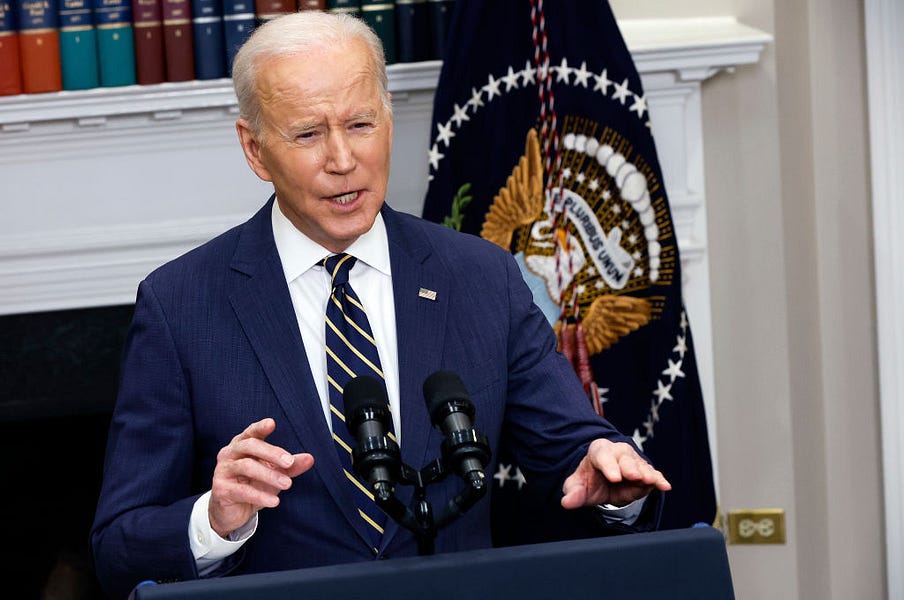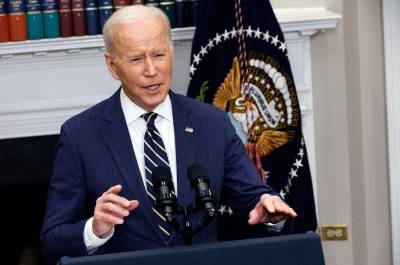Happy Friday. I was on a plane from 1 a.m. to 5 a.m. overnight with an 8-month-old in tow, so I hope you’ll tolerate a slightly abbreviated edition of this newsletter today.
How Congress is Shaping Biden’s Russia Response
When it comes to tangible action, members of Congress have largely deferred to President Joe Biden in responding to Russia’s unprovoked war of aggression in Ukraine. He has shaped the United States’ sanctions on Russian institutions and oligarchs, and he has coordinated with European allies on various options. But over the past two weeks, lawmakers have exercised meaningful influence—through letters, proposed legislation, and public remarks—and have even quietly forced the administration’s hand on key matters without needing to vote.
At center is a consistent dynamic: The White House wants to remain in lockstep with allied countries, even as members of Congress from both parties have sometimes been quicker to embrace ideas the administration or foreign partners have been wary of. This week, the back-and-forth was particularly noticeable.
It was also somewhat messy. On Monday, top lawmakers announced a bipartisan, bicameral bill to ban Russian energy imports and end permanent normal trade relations, known as Most Favored Nation status, with Russia. It would effectively hike tariffs on Russian products, and it was Congress’ first major step beyond the White House’s response to the conflict, with broad support and strong odds of passage.
Before the House could vote on the measure, though, Biden announced Tuesday that he would unilaterally ban Russian oil imports. Administration officials had previously raised fears it would hike gas prices for American consumers, but a growing chorus of lawmakers threw their support behind an oil ban, as we reported in Uphill last week.
Despite Biden’s announcement, House members proceeded with a vote on their own bill to ban Russian oil. But that vote came only after Democratic leaders agreed to weaken aspects of the legislation that the White House was not ready to accept. The trade provisions—which sponsors saw as the bill’s primary objective—were mostly stripped. After the House overwhelmingly approved the pared down bill on Wednesday, Biden announced Friday morning that he will, in fact, support legislation to make the same trade changes the White House pressured lawmakers to halt earlier this week.
On Friday, he said the pause was to give the administration more time to build support among allies around the world to take the same step. Biden said the European Union and Group of Seven countries have agreed to end normal trade relations with Russia.
He added that revoking normal trade relations from Russia will “make it harder for Russia to do business with the United States, and doing it in unison with other nations that make up half of the global economy will be another crushing blow to the Russian economy that’s already suffering very badly from our sanctions.”
Canada revoked normal trade relations for Russia and Belarus a week ago, the first country to do so.
Both chambers of Congress will have to approve legislation to accomplish the move in the United States. Lawmakers likely would have acted sooner, if the administration had left them to their own devices.
Some Republicans have criticized the Biden administration’s broader approach to punishing Russia. America has been slower to the punch than other countries at times, they point out, as the White House has prioritized negotiating agreement among allied countries rather than taking action and expecting allies to follow. Democrats have been more patient with the process, even as they advocate for their own responses.
Rep. Earl Blumenauer, the Oregon Democrat who chairs the House trade subcommittee and who introduced the first bill to revoke Russia’s trade privileges, told Politico this week that House Democrats have to stay in sync with the administration’s “comfort level.”
“I know that there was some hesitancy on the part of the administration. It is no secret,” Blumenauer said, expressing dismay at how the House oil ban bill ended up. “But they are managing an incredibly complex set of relationships, and I think they’ve done an excellent job in doing that.”
Members approved the House measure this week with an overwhelming vote of 414-17. It would ban oil imports from Russia 45 days after enactment of the legislation, while granting Biden authority to waive the ban for certain products he determines to be in the national interest. It also includes procedures for if Congress takes issue with a presidential waiver, allowing for faster consideration of resolutions of disapproval in each chamber.
The House-passed bill calls on the U.S. trade representative to use the influence of the United States at the World Trade Organization to condemn Russian aggression in Ukraine as well as to “consider further steps with the view to suspend the Russian Federation’s participation in the WTO.” But it did not hike tariffs on Russian products.
The original version of the bill would have almost immediately removed normal trade treatment from Russian and Belarusian products after enactment. It would have also granted the administration power to raise the tariffs even higher.
The measure also included language banning Russian energy imports 45 days after enactment, allowing Biden to restore normal trade relations with either country if he certifies to Congress that they have ceased aggression in Ukraine, among other prerequisites.
“Taking these actions will send a clear message to Putin that his war is unacceptable and the United States stands firmly with our NATO allies,” Reps. Richard Neal and Kevin Brady, along with Sens. Ron Wyden and Mike Crapo, said in a joint statement about the agreement Monday.
For now, it is unclear what vehicle Congress may use to advance the tariff increases. It could come as an amended version of the House-passed measure, or as a standalone bill, potentially with changes to the details as the Biden administration sees fit. Brady, the top Republican on the Ways and Means Committee, has introduced the more comprehensive version of the bill in the House, a companion measure to legislation introduced by Crapo and Wyden in the Senate.
Biden on Friday acknowledged Congress’ role in crafting the trade policy response.
“I want to thank Speaker Pelosi, Leader McCarthy, Leader Schumer and McConnell, and Senators Wyden and Crapo, Representatives Neal and Brady for their bipartisan leadership on this in Congress,” Biden said.






Please note that we at The Dispatch hold ourselves, our work, and our commenters to a higher standard than other places on the internet. We welcome comments that foster genuine debate or discussion—including comments critical of us or our work—but responses that include ad hominem attacks on fellow Dispatch members or are intended to stoke fear and anger may be moderated.
With your membership, you only have the ability to comment on The Morning Dispatch articles. Consider upgrading to join the conversation everywhere.